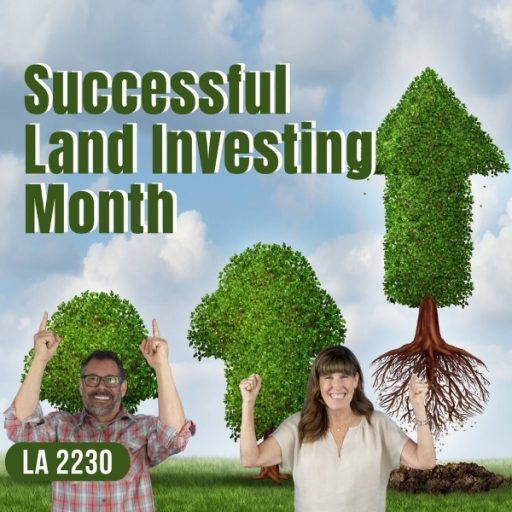This is episode number 2230. Jill and I are talking about what a successful land investment month really looks like. Most people think, “I closed the deal and made $150,000. I’m successful this month.”
Like, “Now I’m going to put my feet up.” That’s what happens all the time. I hear people like, “I just figured I’d coast and then I realize if I coast, it’s going to mess up the next month.” Yep.
I’ll run through my list of what makes us successful each month. Each day on the show, we answer a question from our Land Academy Member Discord Forum. Take a deep dive into land-related topics by popular request.
Alex wrote. “All, does anyone have an accountant who they like, who understands the land business and can set up effective tax strategies and accounting workflows that will support our business, and can do personal returns? If so, I would love their contact info.” So would I.
Understanding The Accounting & Tax Structure
This has been a pretty hot topic since we started Land Academy, and Jill and I have had the same accountant, I’ve had the same accountant for many decades. I’ve asked him over the years if he would take on people from our group. He said, “Absolutely not.” It’s because he has and always has a number of clients that he gets along with. He has met that quota forever. That’s how much money he makes.
It’s over. I respect that because I don’t have that much discipline. I always want things to continue to get bigger. Anyway, I can tell you how we do it, and how and why describe how we have this set up and why it works for us. What I think would really be better instead of me saying, “Call this guy.” It would be better for you to digest it and understand it, and then find an accountant that you get along with socially, or just have a light symbiotic professional relationship with, and tell them what you want.
Tell them this, or anyway, this is what works for us. Our companies are on a cash basis. We have all of our LLCs in one state. They are S-Corp election LLCs, meaning they roll up. Let’s say we have ten LLCs, and each of them makes a certain amount of money. They have expenses and revenue. They have taxable income at the end of that all rolls up their S-Corps under our personal tax returns. They’re cash basis.
Meaning if $50 goes out and $150 comes in, that’s how it gets booked versus accrual accounting, which is very complicated and in our industry unnecessary. There are new rules that came out that if you’re generating more than $50 million or something like that, you have to go on an accrual basis. That doesn’t apply to us.
There are a lot of new rules and a lot of things that happen, but the basics of all of this are the same. What’s very helpful and has been very helpful for us is, I did a lot of years ago, I went and got a broker-dealer license. It’s not what it sounds like. A real estate broker-dealer license allows me, it sounds like I’m a broker now, a real estate broker, which is completely ironic because we’re not brokers at all. For ten years, we’ve been dogging brokers.
What it does is it allows our entities, and us individually, as far as I know, to buy and sell land and be taxed as ordinary income. Meaning, if I had a convenience store and I sold a fruit pie for $1.25 and my cost is $0.30, whatever that margin is, I get taxed on it as far as ordinary income versus all kinds of other income out there, namely in real estate, 1031 exchange type capital gain. If you can understand these things, please, I have to tell you, I know it’s not the greatest topic to talk about, and most of you are probably asleep now.
I am. Just kidding.
I know. I’ll tell you if you’ve turned this over to somebody. How many stories do we have to hear about turning your financial life over to somebody?
Trust them, no.
Mostly sports stars and rock stars and then everybody’s bankrupt because they’re just not managing their, you have to manage your own money. You’re an entrepreneur. Try to get that election. I got mine fifteen years ago. Check it out. I don’t think it’s hard. I heard a couple of people just went out and got it very quickly, if what you’re doing. Please research that. This is just how Jill and I do it.
Every time we have a career path, we ask everybody, “How are you doing?” They’re like, “I don’t know. The guy does it.” I want you to be one of those people. I want you to really know what this is. That’s what works for us. If you’re a Land Academy member, multiple people answered Alex here and said, “Private message me, I’ll give you the name of my accountant.” Do you want to talk about any of this?
No.
Our topic is, What a Successful Land Investment Month Looks Like. Jill, what do you have?
Establishing A Consistent System For Success
In that case, you were yin and I was yang. Nope. Thank you. I’m curious about your thoughts on this one, too. I do know this, a successful land month is in a system. There’s probably a week 1, week 2, week 3, week 4 rolling thing that you normally do. If you don’t, it’s easy to just do one transaction at a time, and you’re never going to get ahead doing that.
Number one, you have to do all these things going on. Within that month, you have things that go on that week. Tuesdays and Thursdays are my deal review time. Wednesdays, I sign all the deeds, if anything that’s sold for the week before, or whatever it is. You have to have those well-thought-out, planned sessions, if you will, just to stay organized and to stay ahead of it. You said you had a whole.
I do.
Take it away.
The 10 Basic Steps & The “Convenience Store” Analogy
Here’s the list. There are ten basic steps, Jill. I’m doing this from memory completely, so can you just interrupt me if I miss one of the steps?
Sure.
Number one, you need to find a place to send mail. We call that in the group trolling/phishing. I think trolling from a phish standpoint is a better way to do it, but trolling has such a bad connotation on the internet these days. What that essentially means is looking around the internet on Zillow and Realtor for places where properties are moving through the system.
There are a lot of properties that fit your acquisition criteria. Number one, find a place to send mail. If you’ve been in the business for a while, like us, that’s in the past. We’re really comfortable with where we’re going to send mail. If you’re new, I want you to spend a bunch of time on that. Have a checklist. Check. “Did I do that this month?”
Check, “Should I do it in the last week of the month or the first week? I think the first week.” Now you’ve got a few places that you’ve tested, you run the red, green, and yellow test, and you love it. I got it. We have three locations that we think are going to work. Number two, download the data and prepare your mailer. Number three, price it. Price your mailer and get it in the mail.
In a perfect world, would that all be like week one of the month or just one week that you plan on it. I know because I’ve heard people talk about this. We do coaching. We do one-on-one coaching with Land Academy. This is one of the things that we’ll do is help you set it up. I know a lot of people like to do it like the middle of the month, is my time to do exactly what you’re doing for finding a new area, dialing the data, scrubbing the data, pricing it, and getting it ready to go in the mail for next month.
That’s great. There are a million ways to do this, but in the list that I’m running down, all of these things need to happen. Just keep this in mind. I’ve said this for the last few years, but really directly, when I’m going down this list, I want you to think about opening, owning, and running a convenience store. What ends up happening for people that don’t see the results that they want is that they open the convenience store and they open the front door, and they only open the convenience store two days out of the month.
That’s ludicrous. You would never do that. It would be open as many hours as you possibly can with the least amount of staff possible. That’s why convenience stores are open 24/7, a lot of them. If you don’t send mail out, or if you don’t answer your phone, or you miss one of these steps, it’s like having a convenience store open 20% of the time. What are we on?
I didn’t know.
No.
What?
Find a place to send mail regardless of the numbers. Prep your mailer and get it in the mail. Not sure what number that is, but it needs to happen, and price that prep and price your mailer. Spends a bunch of time on this so that it’s all correct and it’s in the mail. It’s going to take about two weeks for that mailer to hit in general. It’s just because that’s how the US Postal Office works. We’ve tried to speed it up.
It doesn’t matter. What Jack’s explaining with a mail, you’re going to get it into a system. It’s going to be like, you probably do it once a month, and you probably split your mailer between two batches. Once you have that, the first one goes out, you’re in a system. You’re never going to have a lag again because it’s always going to be methodical and spaced out. That is the whole point of why we’re talking here. You cannot run around like a crazy person and then kick back for three weeks.
If you do, you will burn out, and your business is going to be a mess. You have to think about what Jack’s explaining. All the things that he’s listing here that you need to do in one month, spread them out on a calendar, methodically, and then you’re never running around like a crazy person and you never get hung up if due diligence took you two days on this one property, because everything’s just casual and calm and flowing. Take it.
This mail-out, you have a month’s amount of time to review your processes and do like a step back in your business. “I’m not doing this right? Is everything going okay? Is my wife so happy,” or whatever that ends up being, because my website work is PATLive functional, all the backend administrative stuff should happen somewhere in the middle of the month, or whatever works for you. You can review that while you’re sitting there waiting for the mail to hit.
If you’re in a system six months down the road, your mail is hitting all the time. All throughout this process, you’re answering phones, dealing with the sellers, and maybe closing deals on the buy and the sell side. That’s all going to happen naturally anyway. The more mailers you have in play, the more you can pat yourself on the back and say, “This is a successful month.”
Now you’ve got your administrative stuff is great. You are going to be, like I said, in the process of purchasing at any given time properties, which are non-time-consuming. That means going through due diligence. Jill talks about this all the time. Choose a day of the week where you can run through due diligence and talk to sellers.
You’re going to be on the phone more than you think for the buy side and the sell side. There are ten very specific steps in Land Academy that we go through when you’re new to get you to the end of cashing the check when you’re on the sell side of the property. Just summarize that perfectly. If you’re new, constantly trying new markets, and sending a bunch of mail out.
You’re going to get better all the time, more efficient all the time. My final point is, you’re doing it right when you have week 1, week 2, week 3, and week 4. You have these systems flowing. There’s never a lag. You have properties going in, and properties going out. You might feel like, “I cannot believe all I got done today,” in a great way. That’s what it should be. I open 2, I close 1, I talk to this broker. To the outside world, it looks a little like you’re a crazy person because you’re wearing all these hats, but that’s when it’s the best.
People are calling you to sell. People are calling you to buy. You’re just sitting here going, “Yes, no, let’s do this, let’s do that.” That’s the groove. You’re going to find a groove. It’s like we haven’t talked about this in a long time. First gear, second gear, third gear, fourth gear, fifth gear. First gear is your learning and education phase. Second, you’re figuring out third gear. Third gear is the most fun, I think.
That groove is a perfect way to say it. In every successful business I’ve ever been involved in, I forgot about looking at the money. Where it was just, “We’re doing it, everything’s great,” and then I go look at the money and there’s a lot in there. Celebrating a win is fine, just do it briefly. We’re here to establish processes, learn how to get into the real estate business, or make your existing real estate business better because you already know this works.
Isn’t that funny? I like that. Celebrating a win is a bottle of wine, not a two-week cruise.
It’s not taking time off in any way.
Not yet. That’ll come, but not yet.
You send out 10,000 offers. You should get about a 1% response. That means 100 people are going to call you back. Your job, like we talked about, is a separate those 100 responses from people who are going to buy or sell the property to you for the price you want or some version of that and not. You should do about, let’s just say that’s 1%.
On that 10,000 units, you got 100 responses. You buy a property. Those are pretty good numbers. The key is not to glom on that statistic, mailer yield. The key is to think, “I’m going to multiply that times twelve. Now I’ve got 120,000 mailers out. I got 1200 people who have responded, and 1% of that is 12 properties. If I multiply a $50,000 margin by 12 properties, that’s an amazing number. That’s $600,000 of net income.”
That is a successful month, and the only way that happens is you do the same boring thing every single month until you can hire somebody else to do it, and then you can move on and get bigger. Join us tomorrow where Jill and I discuss why need drives real estate decisions, not want, and why it’s so predictable. I love the predictable part. You are not alone in your real estate ambition. We are Jack and Jill. Information and inspiration to buy undervalued property.















